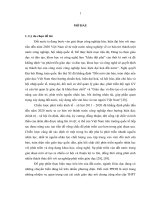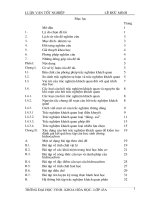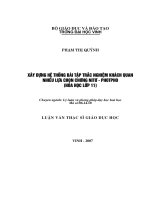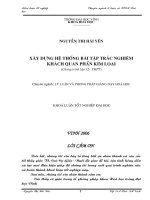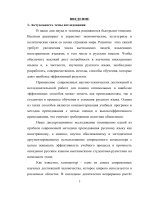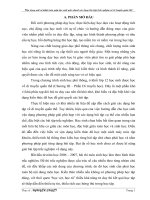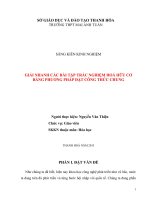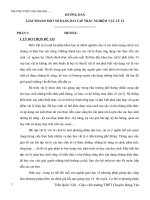bai tap trac nghiem unit3
Bạn đang xem bản rút gọn của tài liệu. Xem và tải ngay bản đầy đủ của tài liệu tại đây (133.58 KB, 7 trang )
<span class='text_page_counter'>(1)</span><div class='page_container' data-page=1>
<b>UNIT 3: AT HOME</b>
<b>(Ở nhà)</b>
<b>GRAMMAR POINTS.</b>
<b>I. Reflexive Pronouns</b>
<b>1. Form (Dạng)</b>
Ngôi thứ nhất myself ourselves
Ngôi thứ hai yourself yourselves
Ngôi thứ ba himself herself itself themselves oneself
<b>2. Use (Cách dùng)</b>
<b>a. As object (Làm túc từ)</b>
<i>* Object of a verb (túc từ cho động từ): để diễn tả hành động quay trở lại người thực hiện (chù ngữ )</i>
Ex: - Oh, I cut myself !
(Ồ, tôi bị đứt tay rồi)
- This fridge defrosts itself.
(Cái tủ lạnh này tự rã đông lấy)
<i>* Object of a preposition (Túc từ cho giới từ)</i>
Ex: I'm annoyed with myself
(Tôi bực bội với bàn thân tôi)
- He spoke to himself. (Anh ta tự nhu )
<b>b. As emphasizing pronouns. (Lùm đại lừ nhan mạnh )</b>
Nhấn mạnh chủ ngừ : Đại từ phản thân đứng ngay sau chủ ngữ hay ở cuối câu.
- Ex: - The King himself gave her the medal. = The King gave her the medal himself.
(Chỉnh đức vua đã lặng cô ấy huy chương)
- Tom himself went to London. = Tom went to London himself.
(Chính Tom đã đi London)
<b>c. Nhấn mạnh túc từ : Đại từ phản thân đứng ngay sau túc từ.</b>
- Ex: The film was rather good, but I liked the music itself.
(Bộ phim khá hay nhưng cải tơi thích chính là nhạc )
- She wanted to take to the manager himself.
(Cơ ay muon nói chuyện với chỉnh ông quản lý )
<b>3. By + reflexive pronouns (Nhóm từ ngữ By + Đại từ phản thân) có</b>
nghĩa là:
<i>* Tự làm, không nhờ ai giúp (without help)</i>
Ex: Alice always does her homework by herself. (Alice luôn tự làm bài tập ở nhà )
<i>* Một mình (alone )</i>
Ex: I "don’t like to live by myself. I want my famiy.
<i>(Tơi khơng thích sống một mình. Tỏi cân có gia đình)</i>
<b>II. Modal Verbs: Must - Have to - Ought to.</b>
<b>1. Must (phải), dùng để diễn tả :</b> <b>_</b>
a. Sự bắt buộc (obligation) hay cần thiết (necessity) theo cảm nghĩ của người nói
Ex: I must write to Ann. I haven’t written to her for ages.
<i>(Tơi viết thư cho Atm. Tói đã khơng viết thư chu cô ây quá lâu rồi)</i>
Doctor to a patient: You must give up smoking.
<i>(Bác sĩ nói với hênh nhân: Ỏng phai bỏ hút thuốc thôi)</i>
b. Qui tắc hay luật lệ. (regulations) và trong chỉ thị hay mệnh lệnh .
Ex: Staff must be at their desks by 8 am.
<i>(Nhăn viên phai có mặt ở bàn làm việc trước 8 giờ )</i>
Cars must not park in front of the entrance.
<i>(Không đậu xe trước lối vào)</i>
c. Must chi được dùng ở hiện tại và tương lai. Khi muốn dùng ở dạng quá khứ, phải dùng Have to.
Ex: We must go now.
<i>(Chúng ta phái đi ngay bây giờ)</i>
She must leave tomorrow.
<i>(Cô ấy phai ra đi vào ngày mai)</i>
<b>2. Have to : Diễn tả sự bắt buộc do yếu tố bên ngoài </b>
</div>
<span class='text_page_counter'>(2)</span><div class='page_container' data-page=2>
Ex : I have to wear uniform to school.
<i>(Tôi phai mặc đông phục tới trường)</i>
Ann’s eyes are not very good. She has to wear glass for reading.
<i>(Mắt của Ann khơng được tốt. Cơ ấy phai mang kính khi đọc sách)</i>
<b>3. Ought to = should (nên): Diễn tả lời khuyên.</b>
Ex : You ought to be careful when crossing the street.
<i>(Bạn phải cẩn thận khi qua điĩờng)</i>
It's rather cold in here. You ought to put in central heating.
(Nơi đây khá lạnh. Bạn nên đặt hệ thống sưởi trung tâm)
<b>UNIT 3: TEST 1</b>
<b>I. Choose the word whose underlined part in pronounced differently from the others in each question.</b>
1. A. plate B. cake C. vase D.take
2. A. chemical B. character C. Christmas D. chicken
3. A. received B. washed C. asked D.coughed
4. A. menu B. tutor C. injure D. rumour
5. A. promise B. realize C. organize D. surprise
<b>II. Find the word with the stress pattern different from that of the others in each question.</b>
6. A. injure B. item C. destroy D. garlic
7. A. medicine B. chemical C. difficult D. reliable
8. A. beneath B. towel C. socket D. steamer
9. A. prevent B. agree C. order D. invite
10. A. succeed B. fixture C. supply D. arrange
<b>IV. Find te one choice that best completes the sentence.</b>
11. All chemicals and drugs must be put in_______ cupboards.
A. lock B. locked C. unlock D. unlocked
12. Children may eat drugs because they look like_______.
A. sweets B. candies C. cakes D. Both A and B
13.You have to _______ children do not play with matches.
A. sure B. make sure C. get sure D. All are correct
14. Each year fire destroys and _______ children because someone plays with matches.
A. damages B. ruins C. strikes D. injures
15. One match can_______ a fire.
A. make B. start C. cause D. All are correct
16. You must _______ electrical sockets so that children do not try to put anything into them.
A. wrap B. find out C. cover D. keep
17. Scissors, knives and small objects are _______ things for children.
A. dangerous B. curious C. destructive D. marvellous
18. You have to keep all dangerous objects out of children’s _______.
A. relation B. reach C. limit D. readiness
19. Remember the kitchen is not a_______ place for children.
A. large B. better C. safe D. spacious
20. Electricity is also dangerous because it can_______ people.
A. harm B. kill C. destroy D. give shock
21. Bill and Bob look so much alike. - Yes, it’s difficult to distinguish one twin_______ another.
A. to B. by C. for D. from
22. Do you think 1 should buy this dress? -_______ my opinion, it’s too expensive.
A. For B. In C. To D. From
23. This orange tastes _______.
A. sweet B. sweetly C. sweety D. sweets
24/ The radio is loud. I can’t bear the noise.
A. too many B. too much C. many too D. much too
25/ On they went out.
A. Tuesday night B. night of Tuesday C. Tuesday's night D. night on Tuesday
26. Whatever you do, you_______ touch that switch, it’s dangerous.
</div>
<span class='text_page_counter'>(3)</span><div class='page_container' data-page=3>
27. She _______ get up so early. She gets up early because she prefers to.
A. has to B. doesn't have to C. must D. mustn’t
28. You _______ forget what I told you. It’s very important.
A. must B. mustn’t C. can’t D. have to
29. Tom _______ while he was shaving this morning.
A. cut himself B. cuts himself C. cut itself D. cuts itself
30. Don’t worry about us. We can _______.
A. look for ourselves B. look after ourself C. look after ourselves D. look ourselves
31. Who repaired your bicycle for you? — Nobody. I repaired it _______.
A. itself B. myself C. ourselves D. himself
32. It’s very late. I_______ to go home now.
A. have B. must C. can’t D. will
33. I’ll do my homework after I _______ the news.
A. am watching B. watching C. will watch D. watch
34. Take an umbrella. It ______ rain soon.
A. has to B. should C. may D. is able to
35. Jack and Jill are very happy together. They love_______very much.
A. themself B. each other C. themselves D. theirselves
36. How long have you and Bill known _______?
A. yourselves B. themselves C. ourselves D. each other
37. There _______ a meeting on Friday because the director is ill.
A. mustn’t be B. may not be C. has to be D. had to be
38. ______ does he have to work so hard? - To earn more money.
A. What B. When C. Why D. Who
39. I went over to talk to Tim at the party because he was ______.
A. himself B. by himself C. itself D. him
40. He climbed out of the swimming pool, picked up a towel and dried _______.
A. by himself B. himself C. itself D. him
<b>IV. Choose the underlined words or phrases that are not correct in standard written English.</b>
41. Tom looked at Ann and Ann looked at Tom. They looked at themselves.
A B C D
42. It isn’t her fault. She shouldn’t blame her.
A B C D
43. We had no help decorating the flat. We did it completely ourselves.
A B C D
44. The man sitting opposite to me on the train kept staring at me.
A B C D
45. Let’s go upstairs, I’ll show you the basement.
A B C D
46. The only thing I’m interested in is why did he do it.
A B C D
47. She wanted to know how long would it take her to get there.
A B C D
48. She’ll be a millionaire by the time she will be twenty.
A B C D
49. They must gather the crop before it rains on September.
A B C D
50. Smoking cigarettes aren't allowed in this hospital.
A B C D
<b>V. Choose the words or phrases that best fit each of the blank spaces.</b>
<b>HOUSEWORK</b>
<b>Son : Dad. Can I go (51) _______ to play?</b>
<b>Dad : Well, did you get your Saturday’s (52) _______ done?</b>
<b>Son : Ah, Dad. Do I have to?</b>
</div>
<span class='text_page_counter'>(4)</span><div class='page_container' data-page=4>
<b>Dad: Well, first you have to clean the bathroom including the toilet. And don’t forget to (54) _______ the </b>
bathtub.
<b>Son : No, I want to do the family room.</b>
<b>Dad : Well, okay, but you have to vaccum the family (55) _______ and the hall, and be sure to dust </b>
everything. Oh, and don’t forget to wipe the walls and clean the baseboards. Next sweep and mop the kitchen
(56) _______ and be sure to polish the table in the living room.
<b>Son : Okay. Okay.</b>
<b>Dad : And (57) _______ your bed and pick up all your toys and put them away. And ....</b>
<b>Son : More?</b>
<b>Dad : Yeah. And then, how about going out for (58)</b> _______ and getting a
big milk shake? But you probably don't want to do that.
<b>Son : No. No. I want to.</b>
<b>Dad : Okay. While you're doing your work. I'll be out in the (59) _______ raking leaves and pulling (60) </b>
_______
51. A. in B. inside C. out D. outside
52. A. work B. job C. thing D. happening
53. A. discipline B. rules C. instructions D. requirements
54. A. wipe B. polish C. scrub D. tidy
55. A. site B. space C. place D. room
56. A. floor B. base C. space D. storey
57. A. do B. work C. make D. get
58. A. lunch B. lunchtime C. meal D. mealtime
59. A. place B. park C. site D. yard
60. A. weeds B. grass C. hay D. plants
=========================================================================
<b>UNIT 3: TEST 2</b>
<b>I. Choose the differently from word whose underlined part in pronounced the others in each question.</b>
1. a. pupil B. student C. human D. rug
2. A. age B. any C. fate D. mate
3. A. value B. music C. currency D. use
4. A. form B. word C. world D. worth
5. A. provide B. decide C. combine D. invent
<b>II. Find the word with the stress pattern different from that of the others in each question.</b>
6. A. follow B. advice C. remain D. direct
7. A. unusual B. convenient C. industry D. anxiety
8. A. explain B. obtain C. contain D. promise
9. A. deliberate B. dramatist C. discovery D. improvement
10. A. invention B. attention C. reflection D. interview
<b>III. Find the one choice that best completes the sentence.</b>
11. You are always late. You need a(n) _______ to wake you up earlier.
A. alarm clock B. watch C. answering machine D. clock
12. At home, I spend my time studying or______ around the house:washing up, cleaning ...
A. working chores B. making housework C. doing chores D. getting work
13. Scissors, knives ... are______ objects.
A. home B. house C. household D. holder
14. This refrigerator can ______ itself. It's frostless.
B. freeze B. frost C. defrost D. froster
15. Get me a ______ . I want to cook this piece of meat.
A. rice cooker B. frying pan C. saucepan D. jar
16. A ______ will help you do the washing up.
A. washing machine B. disher wash C. wash dish D. dish-washer
17. Small objects such as beads are dangerous for children. They can______ them.
A. swallow B. take C. get D. play
18. Where is the______ ? I want to fry these potatoes.
A. steamer B. saucepan C. frying pan D. cooker
</div>
<span class='text_page_counter'>(5)</span><div class='page_container' data-page=5>
A. hard drinks B. soft drinks C. wine D. mineral water
20. We used to wash clothes by hand. Now we have a______.
A. washing machine B. dish washer C. hair dryer D. steamer
21. I was sorry to hear of her ______ to come to the party.
A. refuse B. refusal C. deny D. denial
22. Harry always sits at the same table. He doesn’t sit at______one.
A. an other B. other C. extra D. a difficult
23. Will you ______ me to post this letter tomorrow?
A. remind B. mind C. remember D. suggest
24. How many times did the clock ______?
A. hit B. knock C. strike D. beat
25. The Brighton train _______ at 9.00 o’clock.
A. reaches B. travels C. drives D. leaves
26. Ann was feeling ill last night. She _______leave the party early.
A. has to B. must C. had to D. mustn t
27. I don’t want anyone to know. You _______ tell anyone what I said.
A. must B. mustn’t C. have to D. don’t have to
28. Promise that you’ll be on time. It’s important. You _______ be late.
A. don’t have to B. have to C. must D. mustn’t
29. Ann’s eyes are not very good. She _______ wear glasses for reading.
A. has to B. can C. doesn’t have to D. mustn’t
30. I _______ wear a suit to work but I usually do.
A. must B. mustn’t C. have to D. don’t have to
31. Tom and Ann stood in front of the mirror and _______.
A. looked themselves B. looked at themselves C. looked themself D. looked at themself
32. Be careful! That pan is very hot. Don’t _______.
A. burn yourself B. wash yourself C. dry yourself D. cut yourselve
33. I’m trying to _______ Spanish but I’m not making much progress.
A. learn myself B. work myself C. teach myself D. myself
34. Some people are very selfish. They only think of _______.
A. himself B. itself C. ourselves D. themselves
35. You _______ before you cross the street.
A. have look B. must look carefully C. look carefully D. will look
36. I’m sorry I couldn’t come yesterday. I _______ work late.
A. have to B. must C. had to D. could
37. At Christmas friends often give _______ presents.
A. each other B. themselves C. ourselves D. himself
38. I’m not sure where to go for my holidays but I to Italy.
A. will go B. must go C. may go D. have to go
39. ______ do you have to get up early tomorrow? - To catch the early train to town.
A. What B. When C. Why D. Who
40. Jack was sitting_______in a corner of the cafe.
A. himself B. by himself C. itself D. herself
<b>IV. Choose the underlined words or phrases that are not correct in standard written English.</b>
41. I went out and took an umbrella with myself .
A B C D
42. Do you like working with people or do you prefer working yourself ?
A B C D
43. He’s very selfish . He doesn’t care of other people .
A B C D
44.The sweater that she ordered differs by the one that they sent.
A B C D
</div>
<span class='text_page_counter'>(6)</span><div class='page_container' data-page=6>
47. If you forget his number you can look it up in the telephone address.
A B C D
48. He had to work at an early age because of his family was very poor.
A B C D
49. Women are tired of to do housework day after day.
A B C D
50. Mr. Perez used to think of him as the only president of the company.
A B C D
<b>V. Choose the words or phrases that best fit each of the blank spaces.</b>
<b>A QUIET LIFE</b>
When Mr. Finch retired, he bought a small cottage (51)_______ a seaside village. The cottage (52)
_______ in 1588 but it was in very good (53) _______. Mr. Finch was looking (54) _______ to a quiet life,
but in the summer holidays he got a shock. Hundreds of (55) _______ came to the seaside village. Mr. Finch’s
cottage was the (56) _______ interesting building in the village and many of the tourists came (57) _______
it. From morning (58) _______ night there were tourists (59) _______ the cottage. They kept looking through
the windows and many of them even went into Mr. Finch’s garden. This was too much for Mr. Finch. He
decided to drive the unwelcome visitors (60) _______ , so he put a notice in the window. The notice said: “If
you want to satisfy your curiosity, come in and look around. Price: two shillings and sixpence”.
51. A. on B. in C. at D. into
52. A. built B. is built C. was built D. building
53. A. condition B. connection C. combination D. relation
54. A. for B. at C. forward D. after
55. A. workers B. goers C. makers D. tourists
56. A. good B. better C. most D. best
57. A. to see B. see C. seeing D. saw
58. A. by B. till C. since D. for
59. A. in B. inside C. out D. outside
60. A. from B. away C. off D.to
<b>END OF TEST</b>
<b>ANSWER KEY</b>
<b>UNIT 3: TEST 1</b>
1
<b>.</b>
C 1!. B 21. D 3 1 . B 41. D -> each other 51. D2. D 12. D 22. B 32. A 42. D -> herself 52. A
3. A 13. B 23. A 33. D 43. D -> by ourselves 53. B
4. D 14. D 24. D 34. C 44. b ->opposite 54. C
5. A 15. C 25. A ' 35. B 45. B -> downstairs 55. D
6. C 16. D 26. D 36. D 46. D ->he did 56. A
7. D 17. A 27. B 37. B 47. C ->it would 57. C
8. A 18. B 28. B 38. C 48. D -> is 58. A
9. C 19. C 29. A 39. B 49. D -> in 59. D
10. B 20. B 30. C 40. B 50. C -> isn’t 60. A
<b>TEST 2</b>
1. D 11. A 21. B 31. B 41. A -> me 51. B
2. B 12. C 22. D 32. A 42. D -> by yourself 52. C
3. C 13. C 23. A 33. C 43. C -> about 53. A
4. A 14. C 24. C 34. D 44. C -> from 54. C
5. D 15. C 25. A 35. B 45. B me 55. D
6. A 16. D 26. C 36. C 46. B with 56. C
7. C 17. A 27. B 37. A 47. D -> telephone directory
48. C -> because 1 57. A
8. D 18. C 28. D 38. C 58. B
</div>
<span class='text_page_counter'>(7)</span><div class='page_container' data-page=7></div>
<!--links-->
